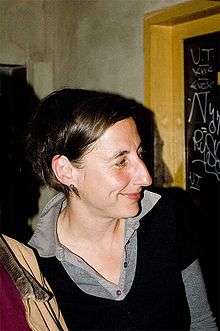Judith Hermann
| Judith Hermann | |
|---|---|
 Judith Hermann (2007) | |
| Born |
May 15, 1970 West Berlin, Germany |
| Occupation | Writer |
| Nationality | German |
| Period | late 20th-early 21st century |
| Genre | short stories and the novel |
| Notable works | Sommerhaus, später (1997) |
| Notable awards |
Kleist Prize 2001 |
Judith Hermann (born May 15, 1970) is a German author.
Life
Hermann was born in St. Joseph's hospital in West Berlin. She grew up in the West Berlin neighborhood of Neukölln and remained there until the mid-nineties, when she moved to the district of Prenzlauer Berg in the former East Berlin.
She holds a Masters degree in German and Philosophy and attended the Berliner Journalistenschule, a highly selective professional academy for journalists. During this training she did an internship with the German language newspaper Aufbau in New York. While she was in America she worked on some of her first literary texts and realized that short stories were "her" genre. In an interview she explained that her training as a journalist helped her to write concisely, although she knew that journalism was not suitable for her.[1]
After returning to Berlin, she worked briefly as a free-lance journalist before she was awarded the Alfred-Döblin stipend from the Academy of Arts, Berlin in 1997. Recipients of this stipend are financed for three to twelve months while they live and work in the Alfred-Döblin House in Wewelsfleth.
In 1998 her first volume of short stories, Sommerhaus, später, was celebrated by critics, who felt they had discovered in her work the "sound of a new generation" (Spiegel 12/1999). Hermann quickly became a leading figure of the Fräuleinwunder ("girl wonder"), a term coined by German literary critic Volker Hage of Spiegel that grouped together female authors like Jenny Erpenbeck, Felicitas Hoppe, Zoe Jenny, Juli Zeh and Julia Franck who were gaining success at the time. Although "Fräulein" is an old fashioned term, not politically correct, and rejected by the authors themselves, the term worked well as a marketing tool and has been adopted in Literary Criticism.[2] Judith Hermann received both the Hugo Ball Prize and the Bremer Literatur-Förderpreis. In 2001 she was awarded with the Kleist Prize.
Her second collection of stories, Nichts als Gespenster, followed in 2003, but to some extent was unable to fulfill the high expectations of critics. In 2009, her latest collection of short stories, Alice, was published. Alice comprises five connected stories about the death of five men, each story sharing a common protagonist, Alice. Iris Radisch, a famous critic for the German weekly newspaper Die Zeit titled her review of Hermann's book "Das große Männersterben" (The death of many men).[3] Despite the melancholic subject, these stories are also about life must go on after death. In this respect, Alice is different from her earlier works, which had a much darker tone.
Hermann's most recent work, her first novel Aller Liebe Anfang, was published in 2014. It depicts a stalking scenario, in which the protagonist Stella is terrorized by a neighbor, Mister Pfister, when she is alone in her home during the day while her husband and daughter are at work and school. Mister Pfister appears one day on Stella's doorstep, wishing to speak with her and, after being denied, becomes fixated on her, leaving increasingly encroaching and aggressive messages in her mailbox and threatening to destroy her quiet family life. Hermann's novel is chilling, in part because of the restrained language she employs and in part because the stalking scenario nods to contemporary social fears about security and vulnerability.
Works
- Summerhouse, later (2001, HarperCollins) ISBN 0-06-000686-2
- Sommerhaus, später (1998, S. Fischer) ISBN 3-596-14770-0
- Nothing but ghosts (2005, Fourth Estate) ISBN 0-00-717455-1
- Nichts als Gespenster (2003, S. Fischer) ISBN 3-596-15798-6
- Alice (2009, S. Fischer) ISBN 978-3-10-033182-3
- Aller Liebe Anfang (2014, S. Fischer) ISBN 978-3-10-033183-0
Films
- Eisblumenfarm (based on "Sommerhaus, später")
- Short-film by Dominik Betz (2004); with Philip Hellmann, Sara Hilliger, Gunnar Solka
- Freundinnen
- Short-film by Tobias Stille (2005); with Anneke Kim Sarnau, Regina Stötzel, Murat Yilmaz
- Nichts als Gespenster
- Drama by Martin Gypkens (2006); with August Diehl, Chiara Schoras, Fritzi Haberlandt
References
- ↑ Interview on 18/06/09 in Freiburg (Germany) during a lecture of her book Alice.
- ↑ http://www.uni-goettingen.de/de/document/.../ExposeBlumenkamp.pdf
- ↑ http://www.zeit.de/2009/19/L-Hermann
External links
| Wikimedia Commons has media related to Judith Hermann. |
- Judith Hermann in the German National Library catalogue
- Judith Hermann at the Internet Movie Database
- Portrait in "ZEIT" by Iris Radisch (German)